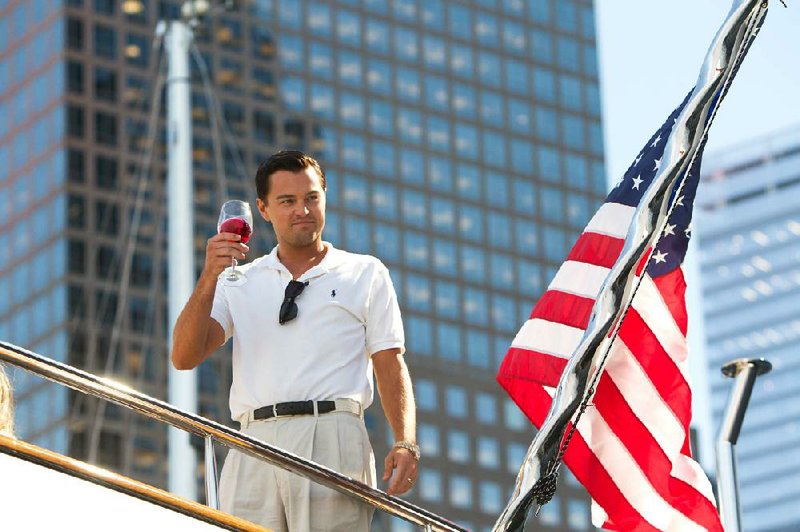The biggest subject for American artists might be “appetite,” the fuse that forces so many of our folk heroes and anti-heroes forward into infamy. It’s not that we can’t get it so much as we don’t want no satisfaction, for to be satisfied suggests having reached a compromise with the universe we meant to master. The American always wants more, whether it’s money or drugs or sex or glory. (Second place is a set of steak knives, third place is “you’re fired.”)
Martin Scorsese has curated a number of these hungry sociopaths over the years, from Travis Bickle and Howard Hughesto the Whitey Bulger-inspired Jack Costello. But his last movie was 2011’s kid-friendly Hugo, a mannered, precisely formal work that suggested the old master might be willing to simply dazzle us with his technical chops, to make a movie that was conventionally excellent and uncluttered by the inchoate longings of desperate achievers. All Hugo wanted, after all, was the restoration of family. All film preservationist Scorsese wanted was us to respect the virtues of the old ways. Hugo was the Scorsese movie for people disturbed by Scorsese movies.
The Wolf of Wall Street is a jittery reversal, a black comedy that plays less like the Good Fellas on Wall Street it was pre-sold as than Good-Fellas on Merck Cocaine. It is a three-hour bacchanal, a restless and occasionally disjointed movie that feels as raw and rapacious as its protagonist, self-made bunco artist Jordan Belfort (played with athletic ferociousness by Scorsese regular Leonardo DiCaprio).
Belfort, whose outrageous (and sometimes dubious) memoir provided the raw material for Terence Winter’s cram-it-all-in screenplay, actually spent only a few months on Wall Street proper. His first job was with the white-shoe firm L.F. Rothschild, where apparently he was taken to lunch by senior broker Mark Hanna - played memorably by Matthew McConaughey in the film - and informed his chosen profession was just an illusory American hustle. Armed with the knowledge that his sole duty was to make himself rich, Jordan is only briefly staggered when the crash of 1987 wipes out Rothschild and puts him on the street. After walking into a bargain-basement brokerage in Long Island, he discovers his talent for pitching penny stocks (the stocks of companies too fragile and flyby-night to be listed on any exchange) to naive investors in flyover country.
Soon, with his neighbor Donnie Azoff (Jonah Hill, playing a character based on Belfort’s partner Danny Porush), Jordan establishes his own firm, which he dubs Statton Oakmont because it rings vaguely WASPy. From the beginning, there’s nothing legitimate about the operation. It’s a classic “pump and dump” scheme where Jordan, Donnie and members of their inner circle buy up the all but-worthless stock of a given company and then turn their brokers loose to browbeat (using the script Belfort had prepared) unwitting suckers into buying it. When the price rises, Jordan and the boys sell off and leave their customers with what inevitably turns out to be worthless paper. (Stratton Oakmont’s rise and fall is widely assumed to have inspired Ben Younger’s 2000 film Boiler Room.)
Soon, Jordan is earning thousands of dollars per minute, has traded in his sensible starter wife Teresa (Cristin Milioti) for Naomi (Margot Robbie), a beer commercial model whom he dubs “The Duchess of Bay Ridge,” and embarked on a hedonistic lifestyle that would shame a hip-hop mogul involving lots of Quaaludes, hookers of various price points, helicopters, yachts and Ferraris as his firm - beneath its calculated veneer of vaguely British respectability - devolves into a frat-ish den of dwarf-tossing and testosterone-fueled bullying, where nobody knows anything and the product itself is imaginary. What’s really frightening is that Scorsese means it as a metaphor for America.
As a morality play or cautionary tale, it’s lacking - Jordan feigns contrition, but his comeuppance, a few months in prison, just removes him from the ranks of the uber rich to the working wealthy as he discovers he can use his superpowers to train others. Aside from losing most of his ill-gotten stuff (and his family), nothing too terrible happens to Jordan. And though that’s an accurate reflection of how things actually are (accumulate enough money, by whatever means necessary, and you will find yourself insulated from the roughest parts of life), it makes for a problematic resolution.
It could have been better. It’s overlong and repetitive; the extra length contributes to the feeling we’re watching more a rough cut than finished production, and there are some matte scenes of Jordan and his entourage on his yacht in an Italian harbor that seem obviously digitally composited. (I noticed the same thing about the view from Matt Damon’s apartment in The Departed.) And none of the uniformly excellent supporting players, not even Jonah Hill, whose loyal but stubborn Donnie is a potentially conflicted figure, or Rob Reiner, as Jordan’s mensch of a father, is given quite enough to do other than be corrupted by Jordan.
But the whole thing is executed with such glee, and DiCaprio delivers a genuinely startling physical performance. (Especially in what is sure to become known as “The Lemmons Sequence.”) While we’re never allowed access to the inner Jordan Belfort, a choice made by the filmmakers that implies the absence of a soul, DiCaprio is remarkably alert and reactive, imbuing Jordan with an animalistic cunning and instinct for self-preservation. While’s he’s capable of kindness, Di-Caprio plays Jordan with no suggestion of misunderstood nobility.
He’s just a hole that can’t be filled.
The Wolf of Wall Street 88 Cast: Leonardo DiCaprio, Jonah Hill, Margot Robbie, Kyle Chandler, Matthew McConaughey, Cristin Milioti, Jon Bernthal, Rob Reiner, Jean Dujardin, Christine Ebersole, Jon Favreau, Joanna Lumley Director: Martin Scorsese Rating: R for sexual content, nudity, drug use, language and some violence Running time: 180 minutes
MovieStyle, Pages 29 on 12/27/2013
